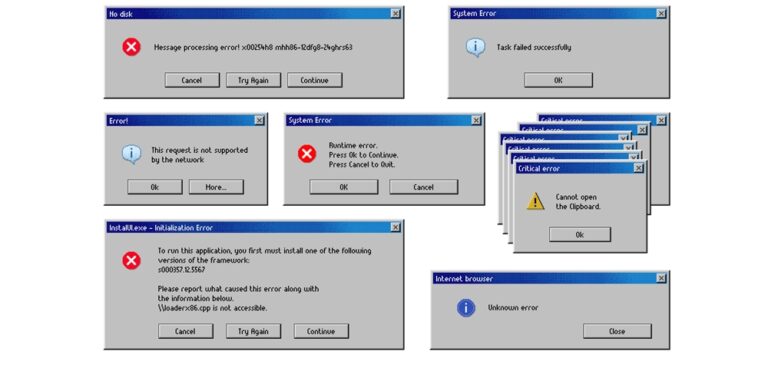Organisations all over the world have been leveraging the power of Windows operating systems ever since the first version – Windows 1.0 – was rolled out in 1985. Yet despite the regular release of newer and more secure versions, many organisations continue to use outdated systems that could leave them worryingly exposed to damaging cyberattacks and data security breaches.
Official figures from the UK Government reveal that cybersecurity breaches remain a common threat, with 32% of businesses and 24% of charities reporting incidents or cyberattacks in the previous 12 months. While these figures represent a decrease from 39% of businesses and 30% of charities in 2022, major lapses in cyber resilience still frequently occur, with outdated systems being among the chief causes.
Now, IT support experts in Surrey, ramsac, are urging organisations to recognise the cybersecurity risks of using outdated operating systems in the modern world. From unsupported systems that lack crucial security updates to IT budget constraints, this article highlights the crucial challenges organisations face when maintaining operational stability while addressing security weaknesses.
1. Legacy Software Compatibility
One of the main reasons organisations stick with older Windows operating systems is their compatibility with other types of legacy software. For instance, some companies use custom-built or proprietary software that may not be easily compatible with newer operating systems and have weaknesses in their cybersecurity armour. Similarly, older hardware may lack the necessary system requirements of the latest Windows operating systems, and upgrading both can be a costly and labour-intensive process.
2. Budget Constraints
Some companies blame the cost involved with upgrading their IT systems as a reason for not renewing legacy software, even though solutions are available that suit most budgets. Nevertheless, the expense involved with upgrading operating systems across an entire organisation can put organisations off due to the cost of new software licences, hardware upgrades, staff training, and downtime during the migration phase. All these could become a barrier for any organisation and especially those with smaller budgets.
3. Risk Concerns
Not all organisations view cybersecurity the same way. For example, some may view technology changes as a risk to their daily operations. There could be a genuine fear of disruptions, data loss, or exaggerated security weaknesses during migration. While a cautious approach to new operating systems is easy to understand, persisting with outdated systems is likely to leave an organisation exposed to a cyberattack. This challenge was recently highlighted when the UK Information Commissioner warned that companies are leaving themselves open to a cyberattack by failing to update software and train staff properly. The warning came after Berkshire-based construction company, Interserve Group Ltd, received a £4.4 million fine for failing to keep staff personal details safe from hackers which is a breach of data protection law.
4. The Challenges of Migration
Migrating to a new Windows operating system is a complex process that poses several challenges for a business. It involves complete accuracy and integrity of vital information to avoid the potential loss and corruption of sensitive data. There’s also the likelihood of downtime occurring which can disrupt normal organisation flow and have a negative impact on productivity and customer service. Additionally, any migration process is likely to require full staff training so workers are familiar with new interfaces and features which could lead to further downtime.
5. Myth vs Reality – The Pros and Cons of Outdated Operating Systems
Using an outdated IT operating systems comes with advantages and disadvantages that organisations should assess according to their security needs and industry requirements. Here, we weight up the pros and cons:
Pros:
- Compatibility: Outdated systems could be compatible with legacy software that performs a vital role in business operations. This could also limit the amount of downtime required for software upgrades.
- Cost Efficiency: Retaining older, outdated systems could save money in the short term due to upgrading costs for new hardware, licencing fees, and staff training.
- Familiarity: Outdated systems will be more stable and familiar to employees that have been using them for a long period, reducing the need for extensive training.
Cons:
- Security vulnerabilities: Manufacturers stop providing updates and patches for outdated systems, leaving them exposed to cyberattacks, malware, phishing scams, and other security risks.
- Performance problems: An outdated system may suffer a dip in performance and become slower because newer software demands more resources.
- Limited support: Manufacturers often end support for outdated systems leaving organisations without assistance, updates, or security patches, and vulnerable to cyberattacks.
- Compatibility: Outdated systems may be compatible with legacy software, but they can also experience compatibility problems with new software and hardware.
- Data Protection Issues: Many outdated systems lack robust mechanisms needed to protect sensitive data which could lead to the corruption or theft of sensitive information in the event of a cyberattack.
- Compliance risks: Some outdated systems may not be compliant with specific industry regulations resulting in legal action, fines, and reputational damage.
According to Dan May, Managing Director of IT support experts, ramsac, organisations that continue to use outdated systems are at greater risk of cyber threats than those that don’t. He said: “Embracing progress in technology is not just a choice, it’s a strategic advantage. Moving away outdated Windows operating systems opens doors to enhanced security, improved efficiency, and greater innovation opportunities that help organisations stay relevant and in tune with the ever-changing technology landscape.”
There may be good reasons why organisations continue to use outdated systems such as compatibility with legacy software. However, these requirements should always be balanced with modern security and efficiency needs. Therefore, the most effective way to guard sensitive data and protect a company from cyberattacks is with a system upgrade and a modern cloud migration strategy that provides security, scalability, and ongoing IT support.


1 Comment
Pingback: How IT Support Enhances Business Continuity | MT Services